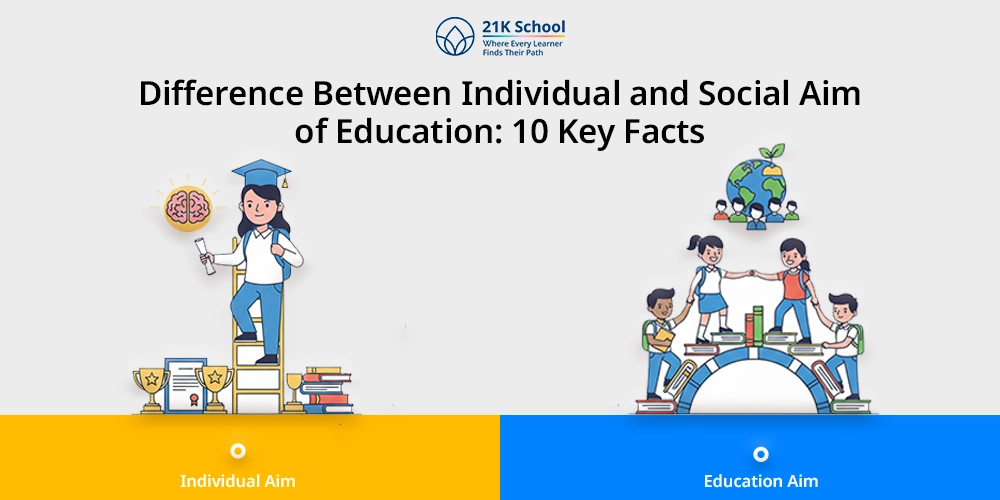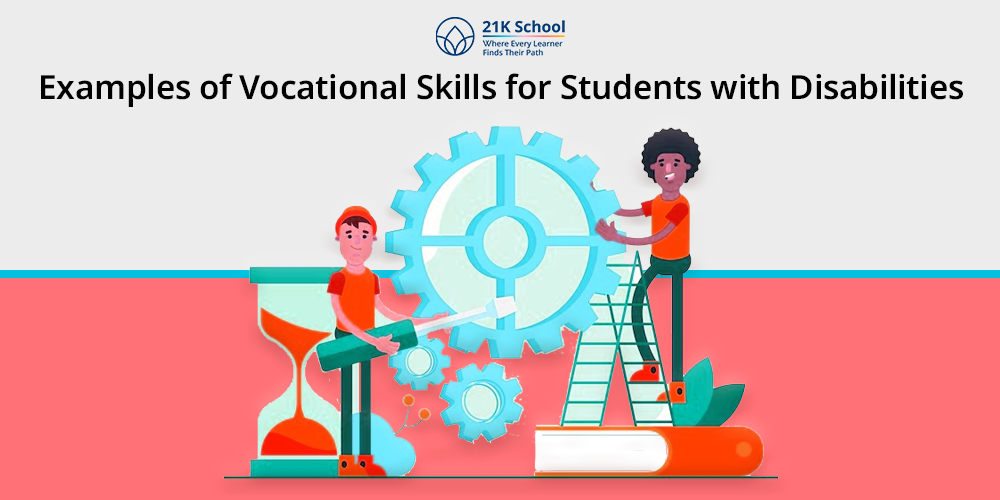
Do you know why vocational skills are essential for students with disabilities?
Vocational skills provide students with practical exposure to real-world scenarios, preparing them for future employment and enhancing their creative thinking skills .
For students with disabilities, vocational skills allow them to boost their confidence and help in learning employable skills.
Vocational skills include various soft skills and hard skills which enable students with either disabilities to gain practical experience and prepare for the competitive job market.
Through vocational training, students with disabilities can acquire practical skills for employment and independent living.
Social and communication skills, digital literacy , and fundamental trades are just a few of the many topics that can be covered in this training.
The goal is to equip students with the knowledge and abilities they need to manage money, find work and behave appropriately in public.
Table of Contents
What are the Examples of Vocational Skills for Students with Disabilities?
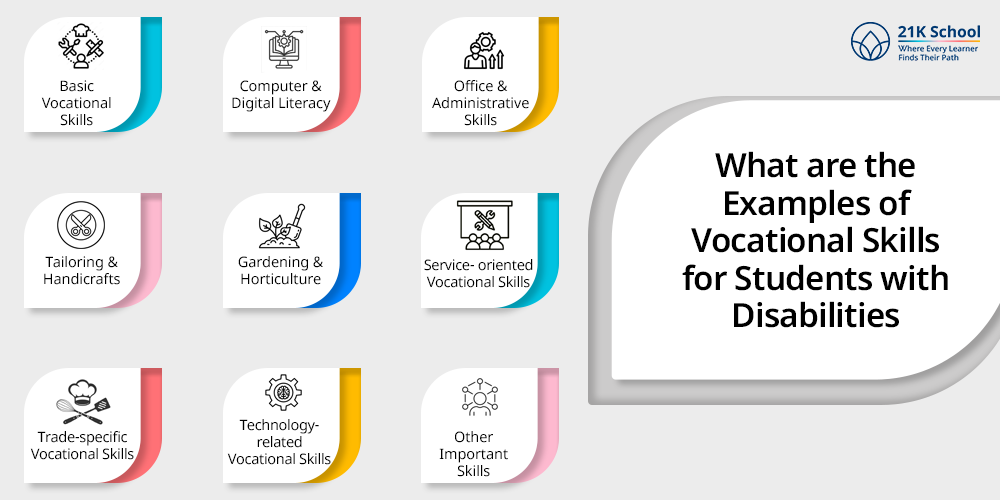
Vocational skills for students with disabilities include various types of hard and soft skills, which encompass various levels of practical knowledge .
These examples include basic vocational skills, office administrative skills, craftsmen skills, technology-related vocational skills, agriculture-related vocational skills and so on.
This type of vocational education allows children with disabilities to gain confidence and work with other students, which promotes an inclusive learning environment.
This helps in generating respect, confidence, and strength to live independently as a common citizen, which results in reducing the student’ stress . The following are examples of vocational skills.
1. Basic Vocational Skills
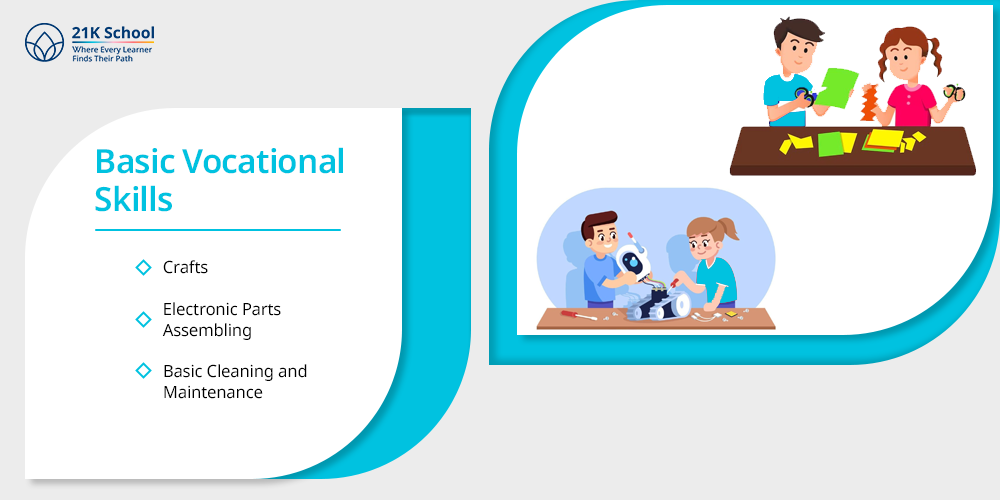
Basic vocational skills include basic work related to art and craft, electronics or any other field. Having a knowledge of basic vocational skills is essential for fostering the capabilities of students with learning disabilities .
The knowledge of basic practical work helps in getting employment as well as enhances hobbies among students who face physical challenges.
1.1 Crafts:
Handcrafted items are created using a range of materials and techniques.
Indulging in handicraft helps in enhancing creative thinking skills as well as enhancing problem-solving skills among students. Indulging in craft requires conceptual thinking and detailing.
1.2 Electronic Parts Assembling:
Electronic parts assembly is the process of methodically assembling various electronic components to create functional systems and devices.
This ability requires an understanding of electronic principles, an understanding of schematics and proficiency with soldering and assembly techniques.
1.3 Basic Cleaning and Maintenance:
Basic cleaning and maintenance is a lifelong vocational skill that allows students to have a proper knowledge of cleaning methods.
These skills are important in a wide range of places, such as homes, offices, and industrial workplaces, as they contribute to health, safety, and overall productivity.
2. Computer & Digital Literacy
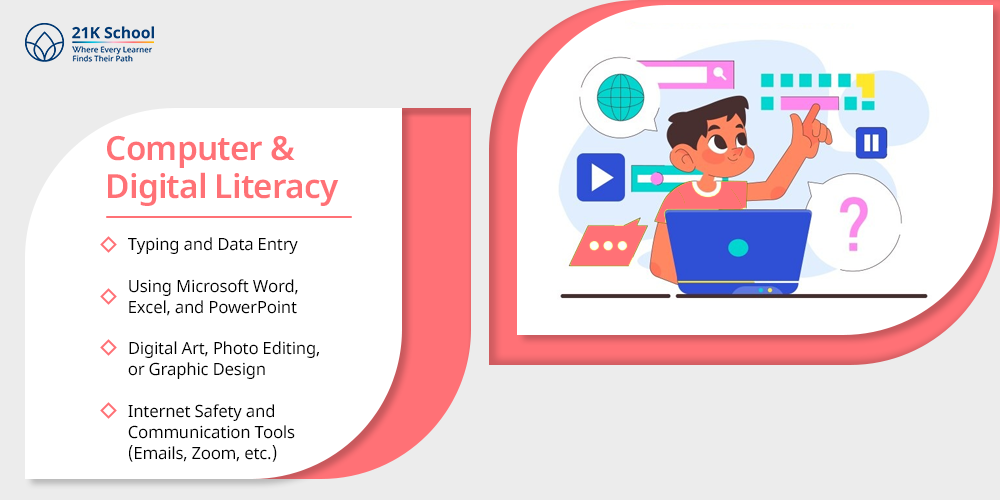
Computer knowledge and digital literacy skills are the vital vocational skills in today’s modern world. As computers have become a part of every workplace, whether it is academics or finance, having computer knowledge is worth it.
Students with disabilities need to learn computer skills which enhance their digital literacy skills and prepare them for future employment.
2.1 Typing and Data Entry
The capacity to efficiently use a keyboard to enter data into digital formats is a component of data entry and typing skills.
Typing proficiency includes knowing how to place your fingers quickly and accurately, which is essential for clear documentation and effective communication.
2.2 Using Microsoft Word, Excel, and PowerPoint
Having knowledge of Microsoft Word, Excel, and PowerPoint has become a necessity. These tools are used in various places, from education and school systems to professional workplaces.
Through these tools, students can prepare charts, documents, data, presentations and so on, which is essential for today’s workforce.
2.3 Digital Art, Photo Editing, or Graphic Design
In graphic design and digital art, photo editing software tools are used to create and edit visual content.
Digital art encompasses a range of creative expressions via digital media, whereas photo editing focuses on enhancing and altering images for functional or aesthetic purposes.
2.4 Internet Safety and Communication Tools (Emails, Zoom, etc.)
Internet safety and communication tools are effective skills in the 21st century skills for students .
Internet safety is the knowledge of using the internet safely by means of protecting personal information and being aware of potential threats like malware and phishing scams.
Communication tools like email and video conferencing platforms are essential for efficient remote communication, which enhances collaboration skills and communication skills .
3. Office & Administrative Skills
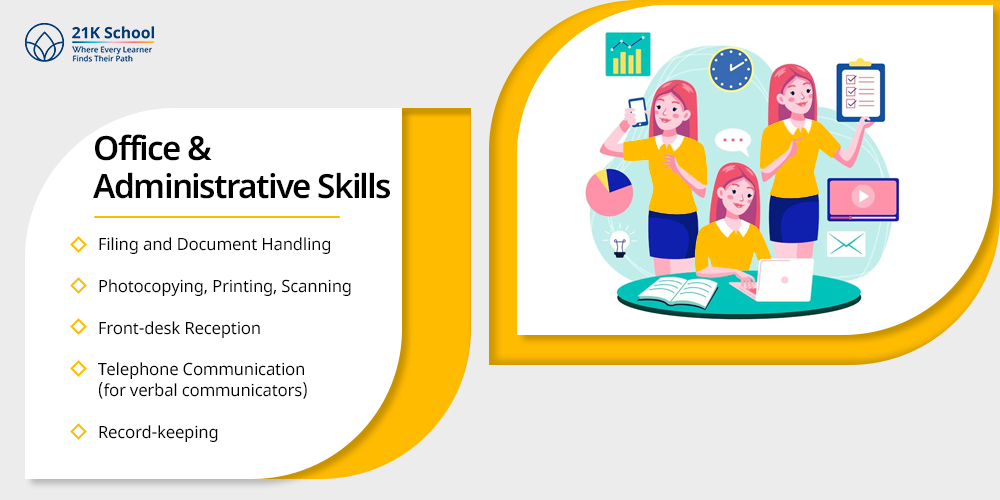
Office and administrative skills are a vital skill set in the corporate sector. Vocational education provides students with office administrative skills such as documentation, communication, executives, receptionists, etc.
This skill helps children with disabilities to enhance their confidence and make them corporate-ready. Through these skills, they can apply for the roles of office workers.
3.1 Filing and Document Handling
Filing and document handling skills involve effectively organising, storing and retrieving both digital and physical documents.
This means understanding filing systems, protecting the privacy of information and ensuring that documents are easily accessible.
3.2 Photocopying, Printing, Scanning
These skills include the use of office equipment to print documents, create copies and digitalise physical documents, maintain paperwork and make sure that documents are available in the necessary formats.
3.3 Front-desk Reception
Front desk reception skills are essential for every office environment, which acts as the first point of contact.
In these skills, individuals have to welcome guests, answer their inquiries and direct them to the appropriate personnel.
3.4 Telephone Communication (for verbal communicators)
Effective telephone communication is crucial for the success of professional verbal exchanges. This skill involves taking messages, returning calls and giving concise, understandable information.
In this skill, active listening and appropriate phone manners are necessary to maintain professionalism.
3.5 Record-keeping
Record-keeping skills include maintaining thorough and organised records of all communications, transactions and other crucial information.
This entails being familiar with the filing system data entry as well as following organisational and legal requirements.
4. Tailoring & Handicrafts
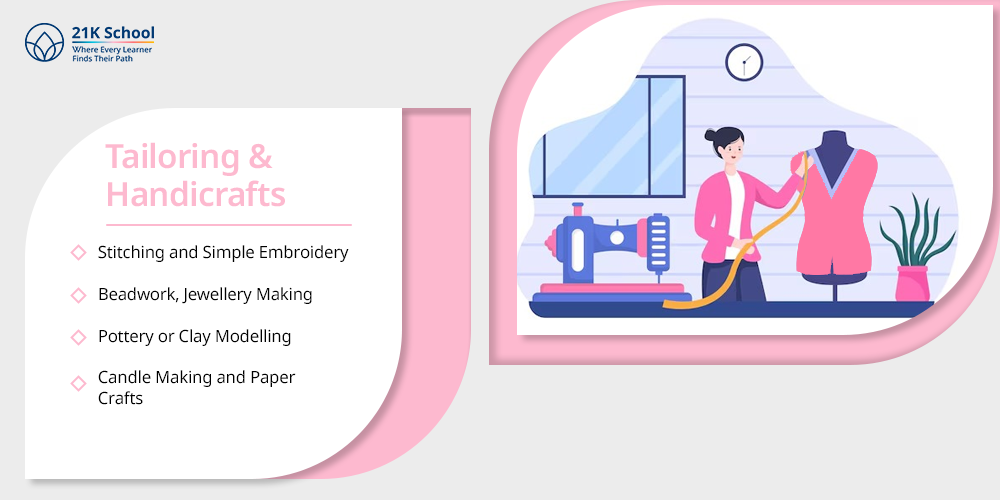
Tailoring and handicrafts include hands-on skills which contain pottery, paper crafts, simple embroidery and so on. These vocational skills are simpler and easier to learn by children with disabilities.
This enables students to confidently learn physical skills for their independence and employment.
4.1 Stitching and Simple Embroidery
Stitching and basic embroidery skills involve the ability to stitch fabric pieces together and use thread to create decorative patterns.
These skills are crucial for creating handcrafted textile items and clothing tailoring, which promotes creativity and personalisation in crafts and clothing.
4.2 Beadwork, Jewellery Making
This skill involves using wires, beads and other materials to design and make decorative items, especially jewellery.
This craft requires imagination, accuracy and an understanding of design principles in order to produce unique and eye-catching jewellery pieces.
4.3 Pottery or Clay Modelling
Modelling skills for clay and pottery include shaping and making clay objects. This includes techniques for wheel throwing, hand construction and glazing ceramics.
These skills allow for the creation of decorative and functional ceramic items as well as artistic expression.
4.4 Candle Making and Paper Crafts
Paper crafts and candle-making skills are the making of ornamental and functional items from wax and paper.
Paper crafts include techniques like card making, origami and other artworks, whereas candlemaking involves melting wax, adding colours or fragrances and then pouring the mixture into moulds.
5. Gardening & Horticulture
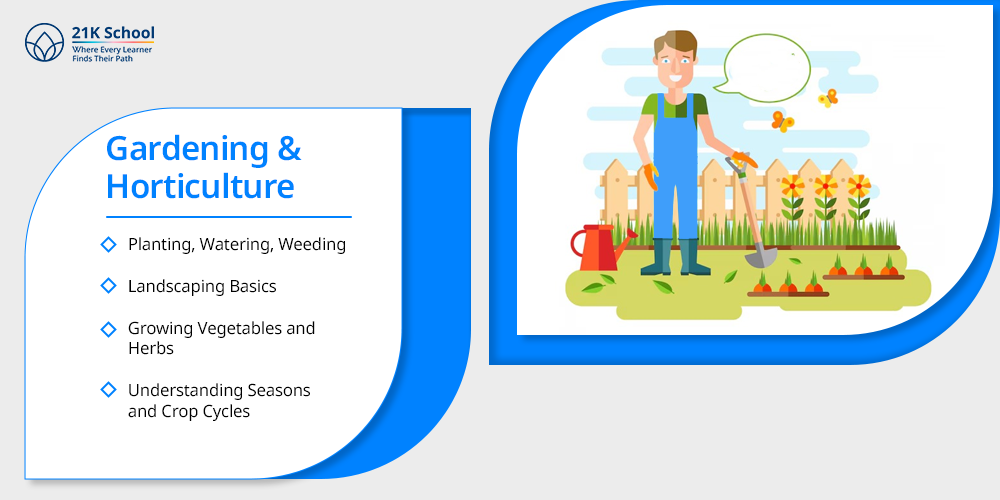
Gardening and Horticulture is an effective vocational skill that allows students to gain real-world experience. Gardening skills involve planting trees, watering them, understanding life cycles and engaging with nature.
Horticulture involves growing crops and vegetables, which helps in enhancing job opportunities in the agriculture field.
5.1 Planting, Watering, Weeding
Basic gardening skills include ensuring that seeds or plants receive enough water and controlling weeds that compete for resources.
These fundamental abilities are necessary to keep plants healthy and encourage growth in a garden.
5.2 Landscaping Basics
Designing and maintaining outdoor spaces is one of the foundational aspects of landscaping.
To create aesthetically pleasing and functional landscapes this requires understanding how to select plants, create layouts and apply hardscaping elements.
5.3 Growing Vegetables and Herbs
Growing vegetables and herbs requires knowledge of how to plant, care for and harvest edible plants.
This set of skills includes understanding the requirements for soil, managing pest control and planting during specific seasons to ensure a successful and productive gardening.
5.4 Understanding Seasons and Crop Cycles
Successful horticulture and gardening require a deep comprehension of crop cycles and seasons.
To maximise quality and yield it is important to know which plants thrive in which climates and seasons as well as when to plant and harvest.
6. Service-oriented Vocational Skills:
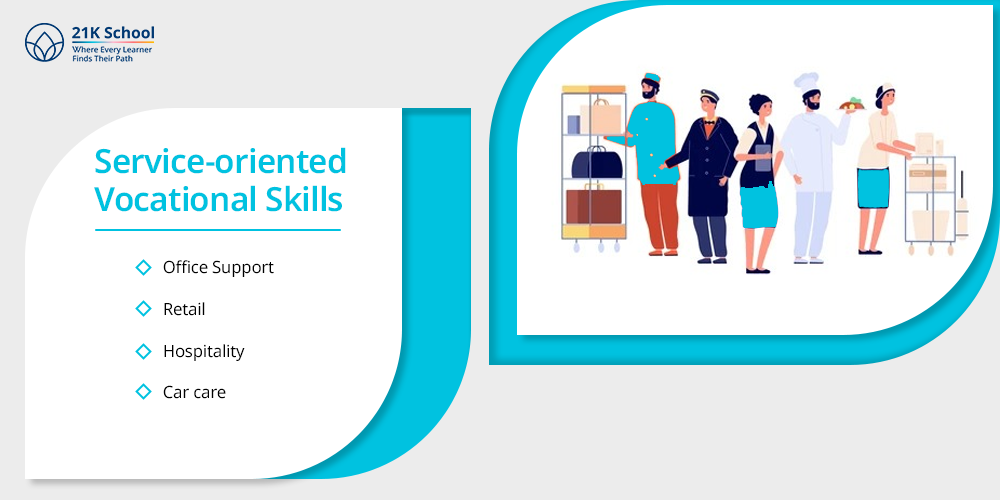
Service-oriented vocational skills include providing services to other people. Learning this skill is essential for students to indulge in self-employment.
These vocational skills provide autonomy and active learning methods , which include office-related work, hospitality, car services, etc.
6.1 Office Support
Office support skills include providing administrative support to ensure smooth operations in an office environment.
This includes responsibilities like team member support and scheduling, file organisation and correspondence.
6.2 Retail
Retail skills include customer service, inventory management and sales techniques to assist customers in a retail setting.
Retail workers must handle transactions, be knowledgeable about the products and ensure that customers have a positive shopping experience.
6.3 Hospitality
Hospitality services are a type of skill which deals with great customer service for positions in the food and beverage and hotel sectors.
This includes jobs such as waiters, hotel staff, receptionists and event planners.
6.4 Car care
One aspect of car care skills is vehicle maintenance and repair. This entails carrying out standard maintenance such as tire rotations, oil changes and system awareness. competence in both safety protocols and customer service.
7. Trade-specific Vocational Skills
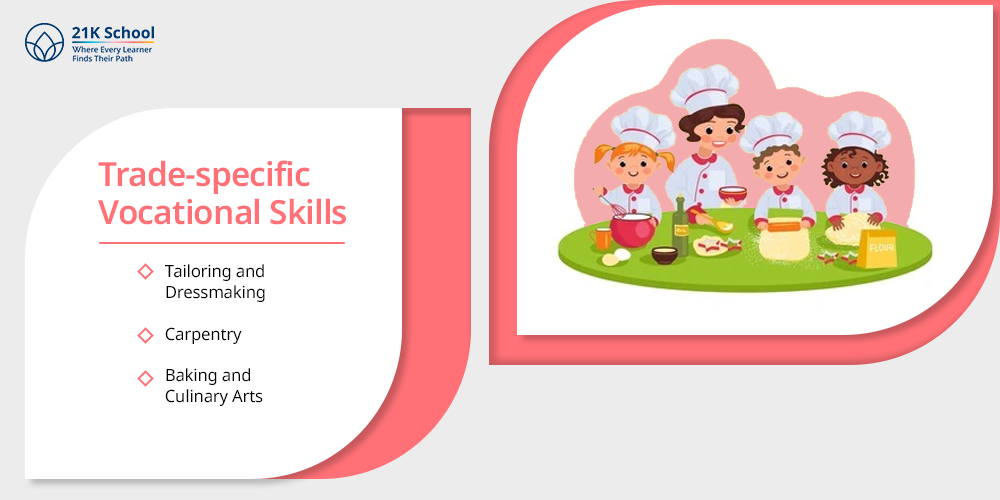
Trade-specific vocational skills are small business or trades that involve performing small tasks. This includes tailoring, culinary, baking, food, etc.
This involves daily tasks, and these types of vocational skills are easier to learn. These vocational skills are highly valued for students with disabilities.
7.1 Tailoring and Dressmaking
One of the skills needed for dressmaking and tailoring is the ability to modify and produce clothing designs.
This means understanding various fabric sewing techniques and how to create patterns. People who are skilled in these areas can create custom pieces and alter existing clothing.
7.2 Carpentry
Carpentry skills involve the construction and repair of wooden structures and fixtures.
This entails being knowledgeable about the tools, materials and construction techniques used to build furniture cabinets and frames.
7.3 Baking and Culinary Arts
Baking and culinary arts are associated with food preparation and presentation. This covers knowledge of food safety laws, ingredient selection and cooking techniques.
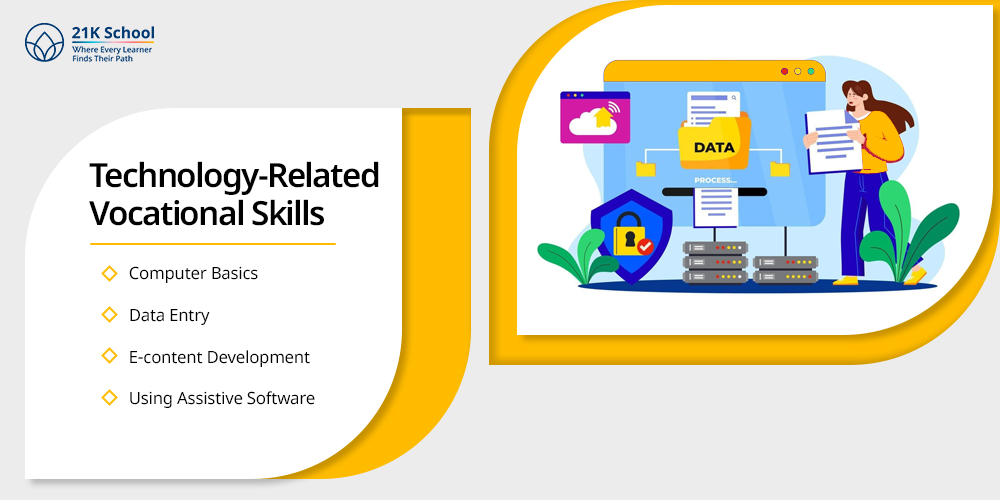
Technology-related vocational skills involve the use of technology and digital tools, which include computer knowledge, software knowledge, hardware knowledge, etc.
Having technical knowledge in the 21st century is a must as technology has been employed in every workplace. It is the most convenient vocational skill children with disabilities should learn.
8.1 Computer Basics
Computer basics skills include knowing how to use hardware and software, manage files and navigate the internet.
Proficiency in these areas is necessary to use technology effectively in a range of personal and professional contexts.
8.2 Data Entry
Data entry skills are necessary to enter data into databases or spreadsheets accurately. This requires typing proficiency, attention to detail and efficient data management and organisation.
8.3 E-content Development
E-content development is a skill which contains producing digital content for online platforms like blogs, social media, and websites.
This covers writing, editing and producing engaging and instructive content.
8.4 Using Assistive Software
Using assistive software skills means utilizing technology designed to assist individuals with disabilities in obtaining information and accomplishing tasks.
Software for screen readers with speech recognition and other tools that improve accessibility of individuals.
9. Other Important Skills
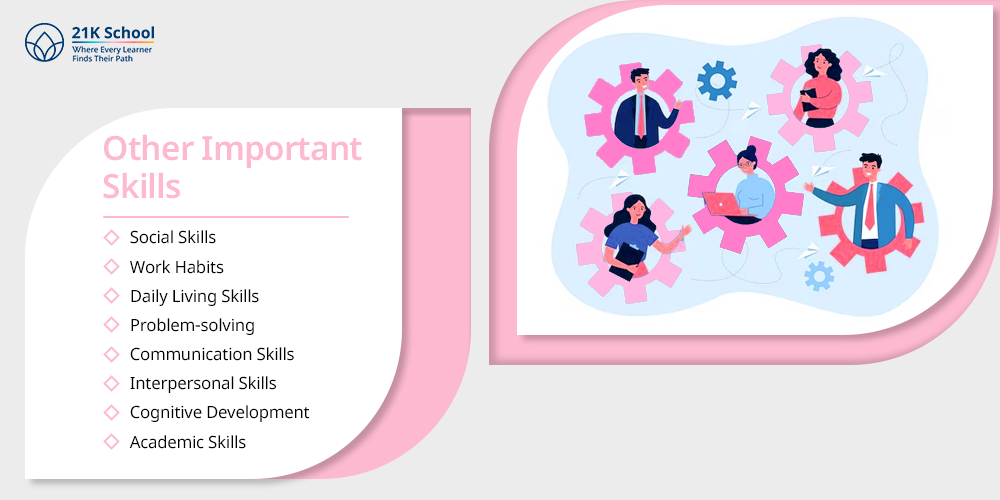
Other important skills include every other aspect of work in the category of academics, social, communication, etc. These skills are vital for students’ development and their academic performance.
These vital small skills are essential to learn for students with disabilities, as this helps them to behave appropriately and enhances their employment.
9.1 Social Skills
Social skills include recognising social cues, building relationships and engaging in dialogue. Both professional and personal success require social skills.
9.2 Work Habits
Work habits are behaviours and attitudes that result in effective work performance such as having a strong work ethic and being dependable and on time.
The development of productive work habits is crucial for success in any field.
9.3 Daily Living Skills
Daily living skills are the abilities needed to handle personal responsibilities and tasks like cooking, cleaning, budgeting and self-care. Both self-sufficiency and general well-being require these abilities.
9.4 Problem-solving
Problem-solving skills include the ability to identify issues, assess situations and develop practical solutions.
People with this skill are better able to overcome challenges and make informed choices in both personal and professional contexts.
9.5 Communication Skills
Communication skills are the vital skills, which is the ability to express ideas concisely and clearly both orally and in writing.
In any field, collaborative learning and relationship building and active interactions rely on effective communication.
9.6 Interpersonal Skills:
Interpersonal skills are the ability to interact with people in a positive way, including empathy, teamwork and conflict resolution.
These skills require building trustworthy relationships and promoting teamwork in the work environment.
9.7 Cognitive Development:
Cognitive development skills include critical thinking, reasoning and information processing.
Cognitive development of children allows them to gain the ability to learn how to solve problems and adjust to new circumstances.
9.8 Academic Skills:
Academic skills are the aptitudes required for successful learning, such as research, writing, reading, comprehension and study techniques.
These skills are necessary for academic success as well as to indulge in lifelong learning .
Why Vocational Skills for Students with Disabilities Matter?
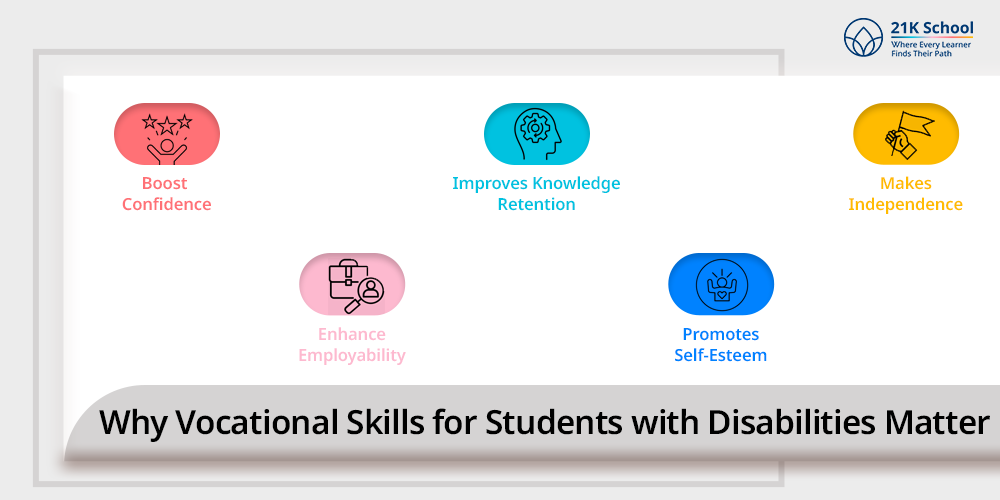
Vocational education plays an essential role in providing life skills to students with disabilities. Vocational skills allow children to become independent, self-learners, employable and learn proper behaviours.
Vocational education helps in creating an inclusive classroom where every student can work together irrespective of any challenges or hindrances.
Here is why vocational skills are essential for students with disabilities.
1. Boost Confidence
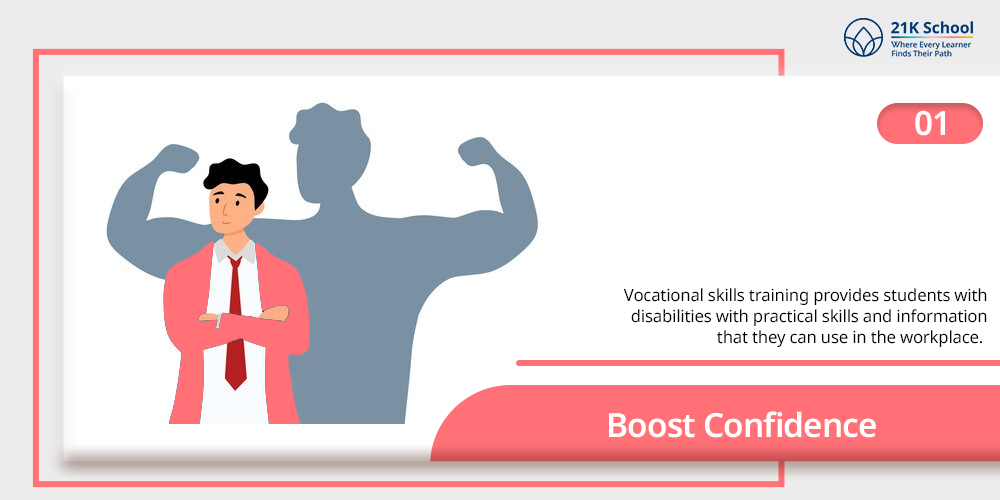
Vocational skills training provides students with disabilities with practical skills and information that they can use in the workplace.
This helps them to build confidence and allows them to overcome challenges, and enhances students engagement with others and strive toward their goals in both their academic and professional lives.
2. Improves Knowledge Retention
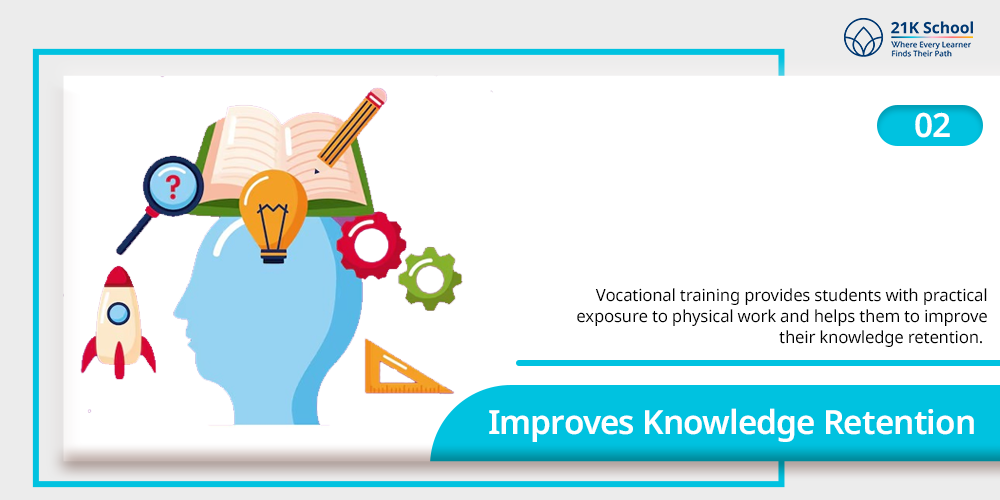
Vocational training provides students with practical exposure to physical work and helps them to improve their knowledge retention.
Students with disabilities may find that practising skills in real-world settings helps them remember and apply the learned concepts. This method of experiential learning strengthens their understanding and expands their knowledge.
3. Makes Independence
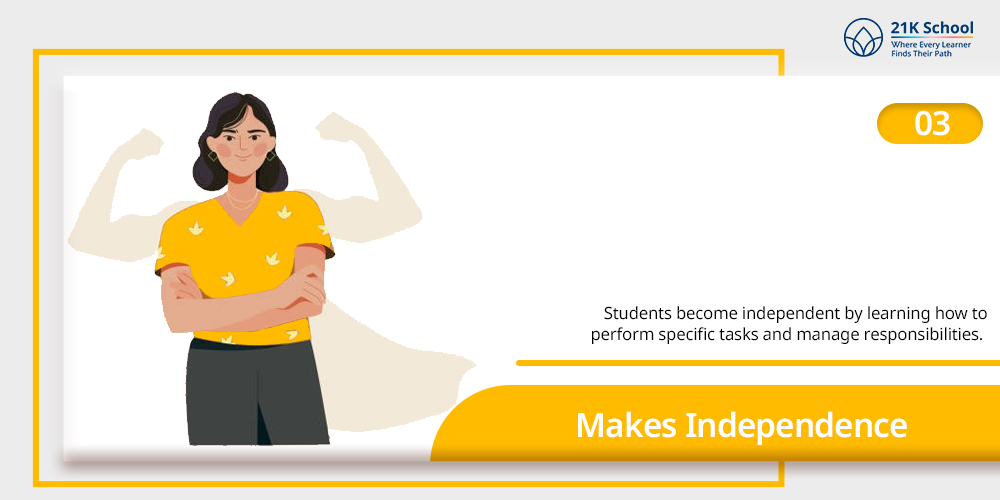
Vocational skills allow students with disabilities to become more independent. Students become independent by learning how to perform specific tasks and manage responsibilities.
Due to their increased independence, they are able to explore the world more freely, which benefits them in many areas of life, including daily tasks, employment and personal care.
4. Enhance Employability
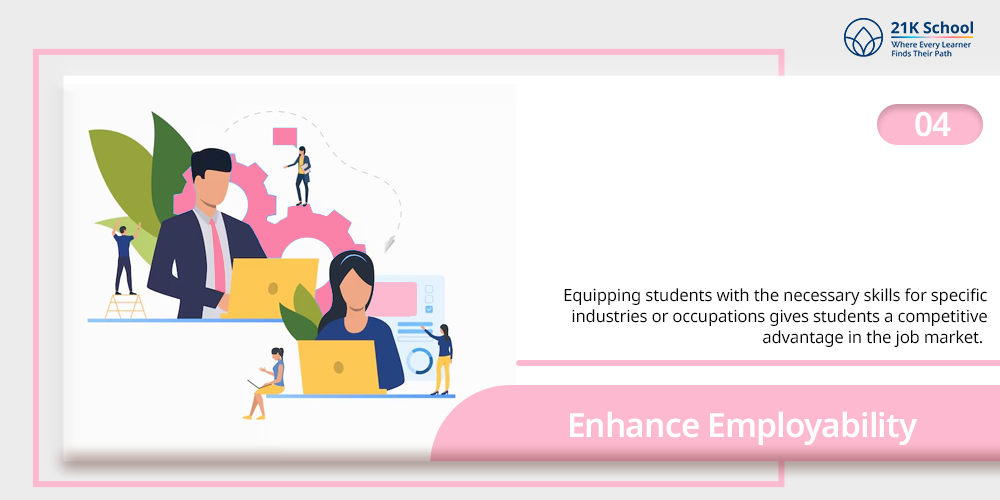
Vocational skills are known for enhancing employability. Equipping students with the necessary skills for specific industries or occupations gives students a competitive advantage in the job market.
Employers usually look for applicants with relevant experience and practical skills, and vocational training can provide students with the necessary skills.
5. Promotes Self-Esteem
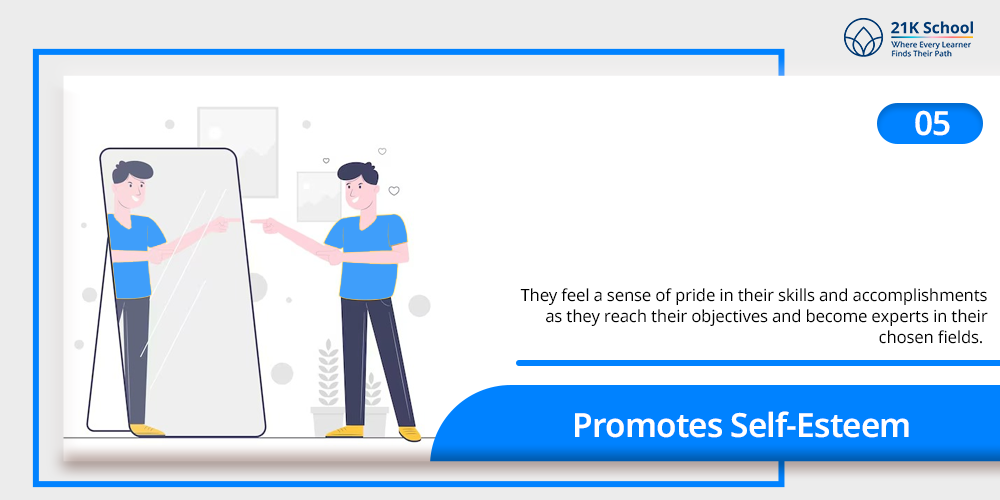
Vocational education helps students with disabilities to increase their self-esteem. They feel a sense of pride in their skills and accomplishments as they reach their objectives and become experts in their chosen fields.
The benefits of inclusive learning environment increases resilience, drive and motivation to explore new career and educational opportunities.
Wrapping Up
For students with disabilities, vocational skills are crucial because they give them hands-on experience in real-world situations, which promotes independence and improves employability.
By providing these students with both hard and soft skills, vocational training fosters a more positive learning environment where they can flourish, in addition to increasing their confidence and self-esteem.
Gaining these abilities equips them for future work allowing them to live more independently and successfully navigate the labour market.
In the end, vocational education gives disabled students the tools they need to accomplish their objectives and make significant contributions to society.

